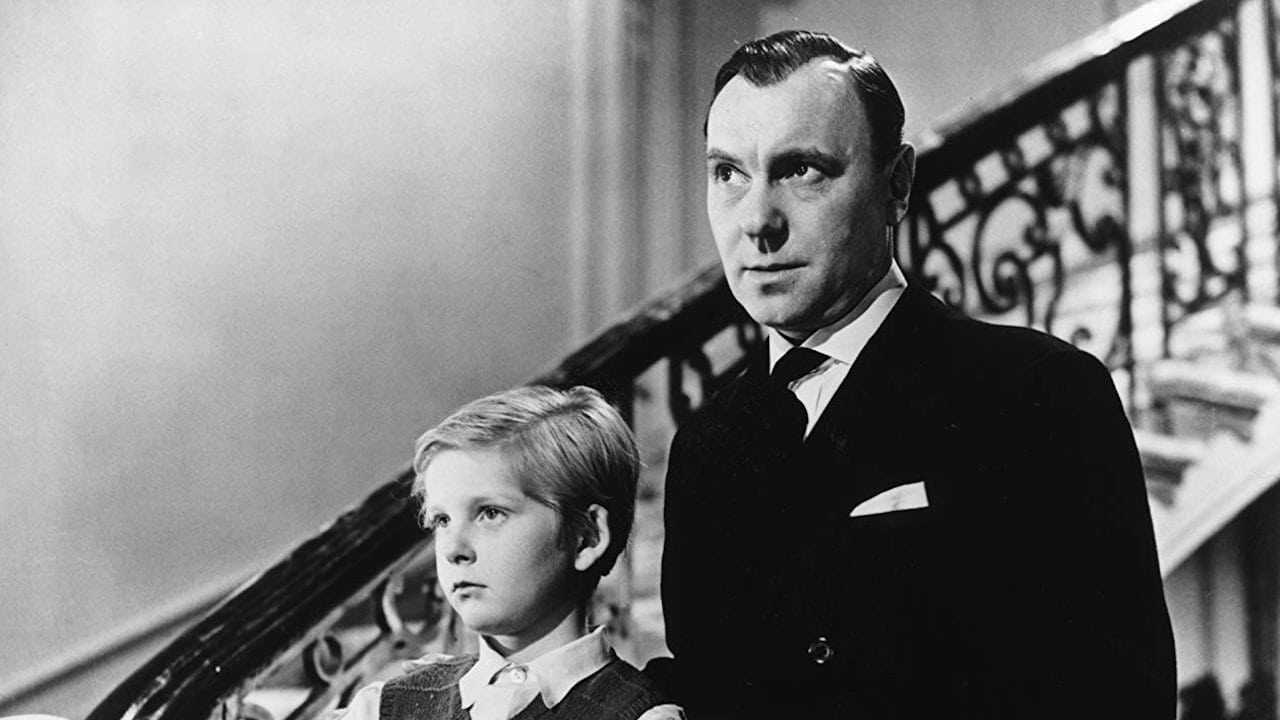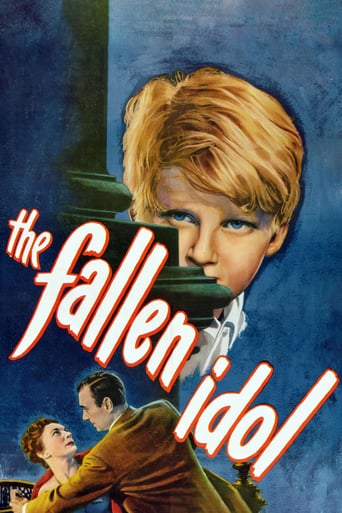Boobirt
Stylish but barely mediocre overall
ScoobyMint
Disappointment for a huge fan!
ChicDragon
It's a mild crowd pleaser for people who are exhausted by blockbusters.
Hulkeasexo
it is the rare 'crazy' movie that actually has something to say.
lasttimeisaw
This is an immemorial conundrum for a middle-aged married man in our monogamous society: whereas his wife becomes more and more embittered and insufferable, out of a stroke of luck (or desperation), he finds a possible new lease on life with a younger, beautiful woman, the strategy of bailing out from a dead-end marriage often goes awry when running afoul of a misery-needs- company retaliation from the deserted and begrudged. This is what happens in Carol Reed's THE FALLEN IDOL, adapted by Graham Greene from his short story THE BASEMENT STORY.In London, Mr. Baines (Richardson) is the butler of the ambassador of an unspecified francophone country, whose wife (Dresdel, snarky, fierce and uncompromisingly obnoxious) also works in the embassy, but he is chastely enamored with a younger colleague Julie (Morgan), when the latter gently hands him her ultimatum, Mr. Baines decides to reclaim his freedom, only Ms. Baine is anything but a soft touch, she will fight her corner until her last breath, but is her falling to her death is an accidental windfall for Mr. Baines or his crime of passion? In the eyes of an audience, the whole act is plain as day, but through the lens of our main subject, a young boy Philippe (Henrey), the son of the ambassador who is left alone in the palatial residence, Greene's mordant tale points up a child's innocence getting embroidered with the falsehood of the adult life, and who is the titular "the fallen idol"? It is Mr. Baines, an avuncular father figure to Philippe and entertains him with his tall-tale adventures in Africa, which doesn't necessarily mean it is true. After incidentally discovering Mr. Baines' assignation with Julie, whom he refers to Philippe as his niece (the jumping-off place of a concatenation of lies which would perniciously compound Philippe's inchoate worldview), Philippe is subjected to an untapped territory of keeping secrets, firstly from the idolized Mr. Baines, then from a harpy Ms. Baines, until he has been caught between defending a murderer (at least from his perspective, no one would blame him for his conviction) and grappling with the horrific happenstance, although, the film dramatically blurs the moral line by depicting Ms. Baines as an utterly unpleasant creature (she is the one dispatches Philippe's pet snake, an apt symbol of the reptilian treachery among adults), so much so that no one is supposed to feel sorry for her upshot, a broad stroke emanates a ghost of misogyny albeit conveniently enhancing the credibility of Philippe's dithered reaction. Yet by and large, the film is a cracking allegory taps into a grey area and ushered by a convincingly elicited child performance as our undivided focal point from a young Henrey, who is not exactly an acting prodigy and the end result should be equally attributed to Mr. Reed's patient guidance as well as to this boy's expressive reaction shots. Ralph Richardson, establishing an impermeable veneer of decorousness and presence of mind nonetheless, carefully carries an undertow of cravenly helplessness writs large in the latter part before a rushed revelation saving the day. As for Michèle Morgan, as svelte as an indubitable attention-grabber, her part is thinly written and largely sidelined. Against the grain of an arresting Bildungsroman, THE FALLEN IDOL potently accentuates Reed's directional prowess and his impeccable knack of frame composition and handsome chiaroscuro, the shots of a nocturnal street-scape tellingly anticipates his defining pièce-de-résistance THE THIRD MAN (1949). For all its aesthetic inclination and profound perspicacity, when in the end Philippe exasperatedly hollers that it is him who upset the vase, one feels unable to refrain from thinking that here is a step too far of Reed's indoctrination, a conspiratorial contemplation in silence might have worked better under this circumstance.
vincentlynch-moonoi
After seeing this film for the second time, I am upgrading my review of it. The one fault this film has is a problem in many older British films -- segments of it have a slow pace. There are definitely parallels here to Hitchcock's style of directing and type of story. However, Hitchcock would have kept the pace up throughout. The film is based on a short story by Graham Greene, and was nominated for Academy Awards for Best Direction and Screenplay.The film highlights a positive relationship between a butler and the young son of a diplomat. The boy idolizes the butler (hence the title). But, the butler (Ralph Richardson) is involved in an affair that he is hiding...but not too well...which the boy stumbles upon. The butler's wife...well, you sort of hope she will meet a bad end...and she does...falling to her death from a window while trying to catch her husband's infidelity. The boy sees part of the incident and jumps to the conclusion that it was murder...while it really was an accident. Of course, he wants to protect his idol, but only manages to make things worse...a sort of "oh what a terrible tangled web we weave when first we practice to deceive" situation.Ralph Richardson is superb here, as are the two women -- his wife (Sonia Dresdel...who will remind you a bit of Gail Sondergaard) and his mistress (Michele Morgan). The only other actor here that most Americans will recognize is Jack Hawkins, who does nicely as the inspector investigating the death. However, special note should be made of the young actor who plays the boy -- Bobby Henrey, who does much better than most of the child actors of that era.I highly recommend this film! It's a good "page turner".
DavidW1947
I don't wish to duplicate other members synopses of the storyline of this wonderful, classic film, but I would like to say something about the performance of the then eight years old Bobby Henrey as Phillipe and how crucial he was to Carol Reed's realisation of The Fallen Idol. Bobby's parents were writers and he had initially been chosen to star in the film both for his looks when Reed had seen a photograph of him peering out of the window of his London apartment on the dust jacket of one of his parents books and because he was bi-lingual, having spent his early childhood in both France and England and spoke English with a French accent, which was called for in the script. Bobby had never acted before, but Reed, a man of infinite patience where children and child actors were concerned, persevered with him over an incredible shooting schedule of five months (a long time for those days) shooting numerous takes of every scene involving the boy and his dialogue, which paid off handsomely, as he managed to coax out of him the most incredible and natural performance by a child actor ever seen on the screen and certainly not bettered since.No better example of all this can be found than in the scene where Philippe is convinced that Baines, his only friend whom he idolises, is going to be sent to the gallows for a murder he did not commit. At this point, he realises just how much he adores and loves Baines and that he cannot live without him. With all the passion in his heart and soul, Phillipe pleads with the police to listen to him as he finally decides to tell the truth about what happened in the hope that this will save his friend: "Oh, please, you must listen to me! I have something to tell you! Oh, please listen to me! Oh, please! Please listen to me! You have to listen to me! You must listen to me! It will only take a moment and it will put everything right." But the police completely ignore him. This scene is so gut-wrenchingly heart-breaking, that it's almost too upsetting to watch and you become totally involved in it and feel very deeply for this increasingly desperate little boy. It is an incredible performance that is so perfect, it has to be seen to be believed. I cannot recommend this film highly enough. It is one of the finest films ever made in the history of the cinema.
Michael Neumann
Before they made 'The Third Man', director Carol Reed and screenwriter Graham Greene collaborated on this mild-mannered suspense story, in which a precocious young boy's devotion to one of his father's servants is tested after he witnesses what appears to be his long-suffering idol pushing his wicked wife to her death down a flight of stairs. An investigation follows, but the film isn't really a mystery since the audience already knows more about what happened than any of the characters on screen. Truth will prevail, although the outcome is ambiguous: the police set matters straight, but they do so from a clue that has no connection to the suspected crime. If the film appears dated today it's only because they don't often make them of this high caliber anymore.

